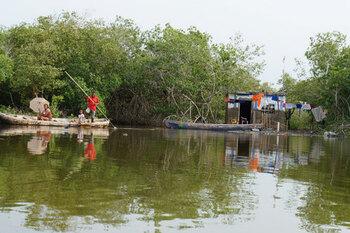Context
The coastal regions of Colombia and Ecuador are feeling the impacts of climate change more and more. Both of these countries are particularly vulnerable to extreme climate events. By the end of the century, Colombia is expected to experience an increase in average temperatures of more than two degrees Celsius, which will lead to rising sea levels, the disappearance of coastal strips and higher rainfall. These changes will have a severe impact on the people, infrastructure and economic activities that benefit from coastal ecosystems and the services that they provide. Mangrove forests, for instance, act as natural barriers against flooding and storms. Their destruction exposes people more to the effects of wind and water.
Ecosystem-based adaptation (EbA) to climate change constitutes a promising alternative or supplement to conventional technical ‘grey’ measures. The primary objective of this approach is to promote the conservation and sustainable use of ecosystems, such as tropical and mangrove forests, in order to strengthen the resilience of humans and the natural environment as well as to mitigate the impacts of climate change. Institutions and organisations in Colombia and Ecuador have considerable potential for effectively implementing strategies and measures geared to ecosystem-based adaptation.
Objective
Communities in coastal regions of Colombia and Ecuador are less vulnerable to the impacts of climate change. National and local authorities integrate ecosystem-based adaptation as a permanent approach in their policies and planning instruments.
Approach
The project supports national and local authorities in Colombia and Ecuador with integrating the approach of ecosystem-based adaptation to climate change into relevant policies, plans and strategies. In cooperation with its partners, the project team plans and implements measures targeting ecosystem-based adaptation. The first step entails an assessment of climate risks and vulnerabilities on the ground. Through individual and institutional training courses, the project provides representatives from national and local authorities, communities and other stakeholders with the knowledge required to understand the impacts that climate change has on their daily lives and to increase their resilience. In addition to working closely with partners in the project regions of Cartagena de Indias in Colombia and Santa Ana and Jipijapa in Ecuador’s Manabí Province, the project team also cooperates with public authorities, private sector companies and communities in other regions and helps them incorporate ecosystem-based adaptation into their planning processes. The team assesses and collates the progress, results and successful models emerging from the project and disseminates these both nationally and internationally.
In addition, the project aims to develop strategies for securing additional funds to finance ecosystem-based adaptation measures after the project has ended. In Ecuador, the activities are being implemented by the non-governmental organisation International Union for Conservation of Nature (IUCN).
Results
The Colombian Ministry of Environment and the National Planning Department have adopted and mainstreamed the ecosystem-based adaptation approach in their operations. The project team advised these two institutions in formulating the national climate change policy and the national plan for climate change adaptation. Two concrete measures currently under way in the Colombian coastal city of Cartagena are the restoration of the natural stream and river flows in the urban area and the conservation of the nearby mangrove forests. Both are vital for flood control and, as such, for preserving Cartagena’s old city centre, which is a UNESCO world heritage site. In the future, these measures are to be refinanced through the city’s own fee collection scheme for ecosystem protection. Further measures are being planned for the department of Córdoba in Colombia as well as for the coastal province of Manabí in Ecuador.

